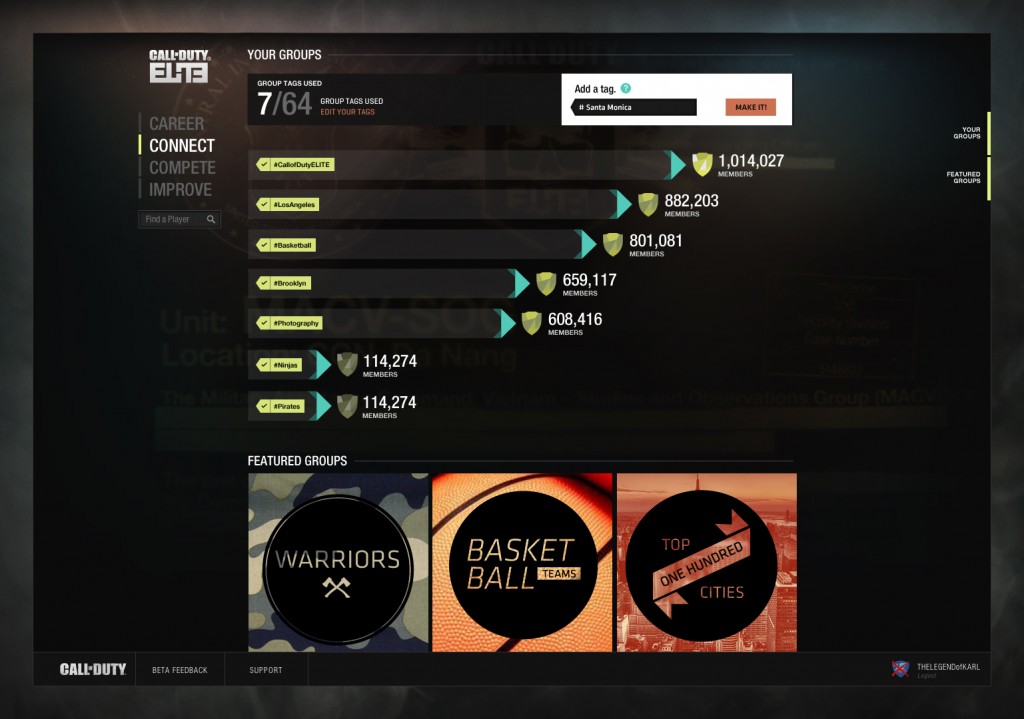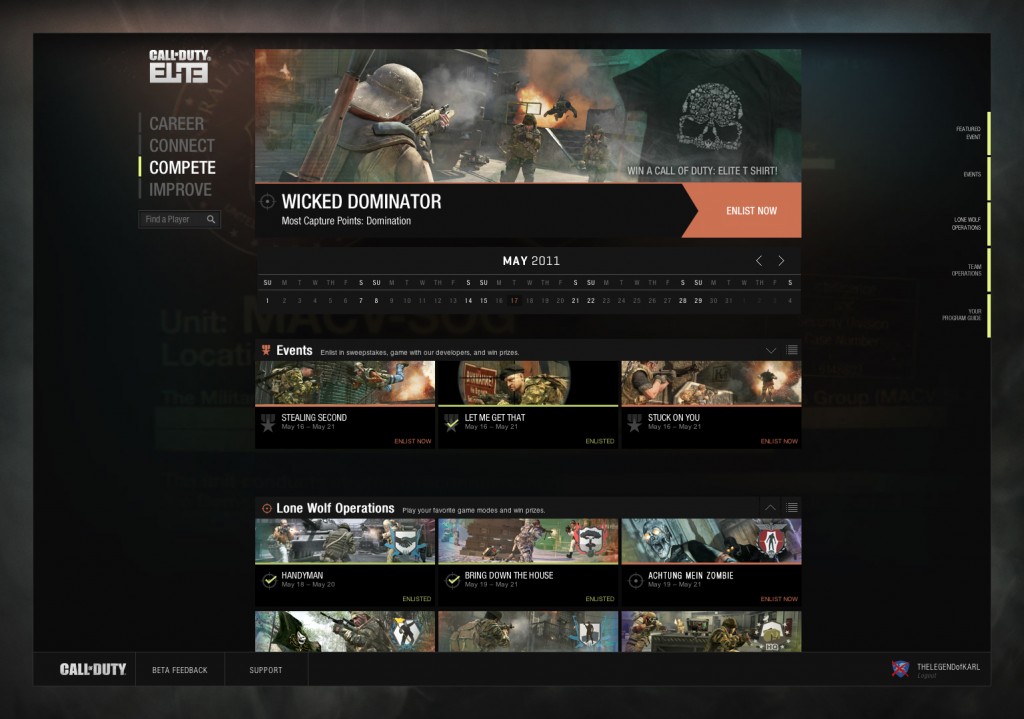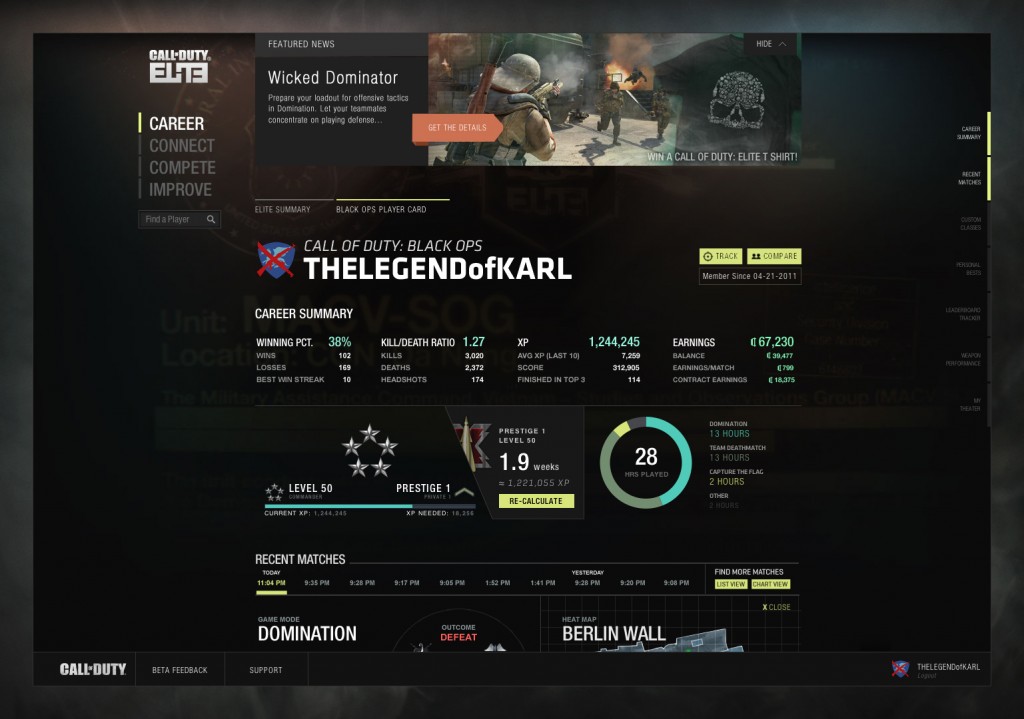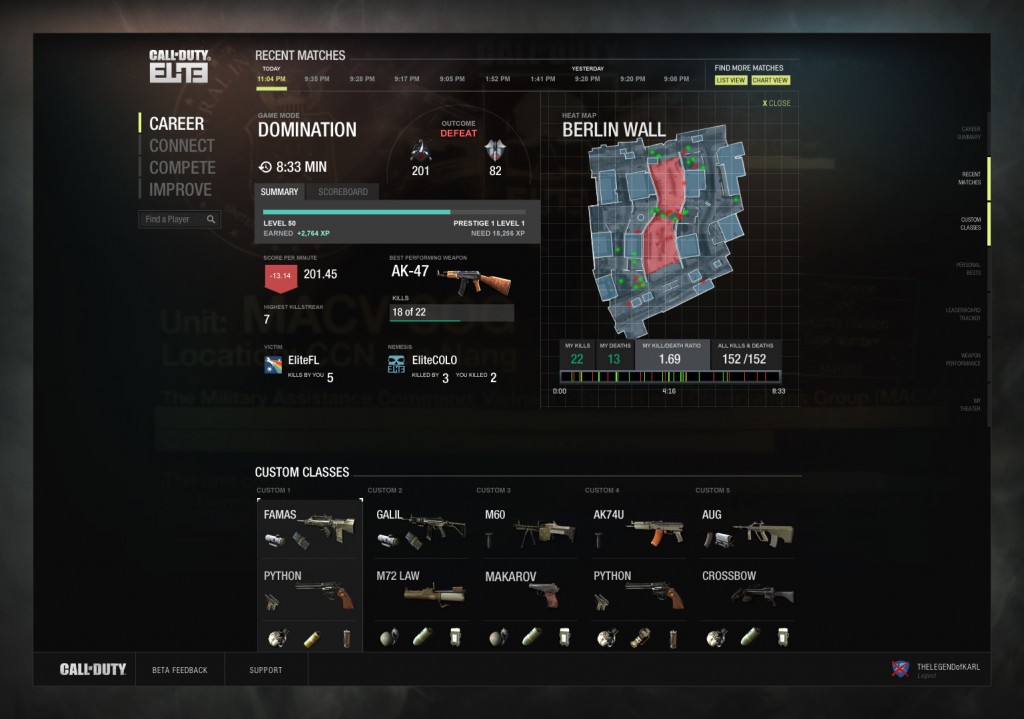On Monday night, the Wall Street Journal posted an article introducing the world to “Call of Duty Elite,” a new Activision offering that will layer social networking features on top of its popular “Call of Duty” first-person shooters. Though the details are still being worked out, “Elite” will feature some kind of paid, subscription-based tier.
Because the news broke on the Wall Street Journal, it was understandably written for an investor-dominated audience and was light on specifics relevant to the hardcore “Call of Duty” gamer. Absent complete information about “Elite,” the Internet rumor mill leaped into action, with “Call of Duty” fans raging on Twitter and in gaming forums about how they didn’t want to pay a monthly fee to play “Call of Duty: Modern Warfare 3” online when it releases this fall.
Slow down everybody. “Call of Duty Elite” is not a sign of the apocalypse.
Like just about every other journalist given a chance to preview “Call of Duty Elite,” I signed a nondisclosure agreement that prevented me from revealing details about the service until 6 a.m. this morning. Now that agreement’s expired, I’ll explain why I’m cautiously excited about some of the features Activision is bringing to the table when it launches “Elite” for the PC, Mac and a number of mobile platforms.
If it’s done right, “Call of Duty Elite” will combine the vapid addictiveness of social networking sites with the smack-talking fun of online first-person shooters. With robust support for social groups, gaming clans and video sharing, plus contests in which Activision and corporate partners give away real prizes, the service could become 2011 and 2012’s ultimate timewaster. An online beta test is set to begin soon, using “Black Ops.” The service will launch in full alongside “Modern Warfare 3” on Nov. 8.
As with anything that sounds cool but is still in development, there are caveats. First, “Call of Duty Elite” will have a free tier and a paid tier. As of right now, it’s not clear what exactly qualifies as “free” and what will cost money. For its part, Activision has stressed that “Call of Duty” players will not be asked to pay extra for anything they currently get when they buy the game in a store. It was also made pretty clear that the paid tier will include some kind of subscription fee that will cover any and all paid downloadable content released for the game. Beyond that, though? It’s a mystery. It’s hard to pass judgment without seeing a finalized list of features.
Additionally, I have a few concerns with how much control “Call of Duty Elite” will give users over their personal information. As a sometimes-frustrated Facebook user who recently spent several days wondering what the heck was going on with all that data I divulged to Sony, I’ll likely have my eye on the terms of service and privacy options, once they’re more fully explained. During a quick question-and-answer session, Activision representatives said all the right things in answering my privacy questions, but I’m withholding judgment until I see a final product.
Now, let’s delve into the details.
“Call of Duty Elite” isn’t a game. Essentially, it’s a social networking service designed to be integrated with “Call of Duty: Black Ops,” “Call of Duty: Modern Warfare 3” and any future installments in the franchise. It’s being developed by a new Activision studio, Beachhead.

The ability to join groups and clans is something I've long wanted to see integrated into Xbox Live. Looks like Activision is beating Microsoft to the party.
The phrase that came to mind after seeing “Elite” and getting an explanation of how it would work is “Bungie.net on steroids.” Though “Call of Duty” games have long since taken over the weekly Xbox Live activity charts and relegated Bungie’s “Halo” franchise to second-banana status, Activision’s games have lagged the statistical and community features found over at Bungie.net.
When I saw “Call of Duty Elite,” though, it was clear that Beachhead has not only set out to match everything at Bungie.net, they’re seemingly aiming to match or beat every social networking feature we’ve seen rolled out in the past few years of video gaming.
It’s not exactly a secret that developers of online games are rabid students of how we play their creations online. In online first-person shooters, developers track data like how much time players spend online, which maps, guns and perk loadouts are most popular and which locations on multiplayer maps see the most action. Presumably, developers take that information and use it to fine-tune their games via downloadable patches, or they incorporate the feedback into a sequel. Or they just sit back and watch videos of us dying in the same spots in exactly the same way, over and over. Occasionally, cool developers like Bungie share some of that data with their players.
If it works like Activision says it will, “Call of Duty Elite” will put vast quantities of data directly into the hands of players of “Black Ops” and “Modern Warfare 3.” You’ll not only be able to see your kill-death ratio and career winning percentage, you’ll be able to break down your performance on specific maps and find out which weapon you’re most successful with. You’ll be able to spot trends such as your frustrating inability to cross a particular bridge without being shot in the head by a well-hidden sniper. Theoretically, you’ll be able to use this information to make yourself a better merchant of death.
Layered on top of that will be a lot of social networking functionality, the likes of which I’ve long wanted to see integrated into Xbox Live’s friends list. Just like you would on Facebook, you can join dozens of groups, ranging from your four roommates from your sophomore year of college to fans of the San Francisco Giants or members of the Genovese crime family. You can hop into each of these groups to compare your performance against each member and talk a little smack.
Now, click on this link or head over to YouTube and search for “Black Ops.” It’s OK, I’ll wait. See all those videos? At some point, Activision must have realized it was sitting on a potential gold mine of video content. [Disclaimer: Chances are, many of those videos contain language unfit for printing on the website of a family newspaper.]
Rather than let Google-owned YouTube monetize the heck out of all that content, “Call of Duty Elite” will feature robust support for fan-made “Call of Duty” videos and screenshots. Just as you would on Facebook or other photo and video-sharing sites, you’ll be able to tag players featured in the video you create. Whether I like it or not, my propensity for being headshotted over and over again without being able to get off a shot will likely be immortalized by someone.

Activision plans to hold periodic contests in which "Call of Duty" players can compete to win real prizes.
On top of all this stuff, Activision plans to use “Call of Duty Elite” to give away actual prizes to gamers who complete certain challenges. One hypothetical example involved seeing who could make the best video of a tomahawk kill, with awards like gift cards or T-shirts offered to winners. Other hypothetical examples governed other aspects of gameplay, such as racking up ridiculous numbers of assists in multiplayer.
In addition to all that community stuff, Jay Puryear, a senior manager from “Black Ops” developer Treyarch, said “Call of Duty Elite” would offer an “instruction manual for multiplayer.” In addition to being able to make yourself a better “Call of Duty” player by analyzing your statistics, you’ll be able to read Activision-furnished overviews for multiplayer maps, as well as weapons and attachments.
To an extremely casual “Call of Duty” player, “Elite” seems like the ultimate in fan service. When I hear about all these features, plus the fact that Beachhead will even have a dedicated “Call of Duty” customer service team, it’s easy to understand why Activision is talking about a paid level of service. Presumably they have to offset their costs somehow. Whether “Elite” takes off will depend on whether the die-hard “Call of Duty” fans – the folks uploading millions of hours of video to YouTube and posting ads in gaming forums looking for clan members – buy in.
My guess is that Activision has done its homework and is at least partially correct. There’ll be a certain subset of “Call of Duty” players willing to subscribe to downloadable content and advanced levels of service. Whether those players will be numerous enough to justify an entire new type of infrastructure for online first-person shooters is an open question.
Follow Eric Wittmershaus on Twitter and join the GameWit blog group on Facebook.





